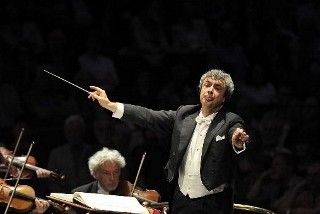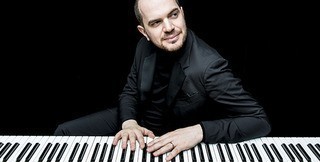|
Back
A Desolate Manfred, a Fiery Keyboard New York
David Geffen Hall, Lincoln Center
02/02/2017 - & February 3, 4*, 7, 2017
Pyotr Ilyich Tchaikovsky: Piano Concerto No. 1, Opus 23 – Manfred Symphony, Opus 58
Kirill Gerstein (Pianist)
New York Philharmonic Orchestra, Semyon Bychkov (Conductor)

S. Bychkov (© Chris Christodoulou)
“Tis not difficult to die”.
From Manfred, by George Gordon Byron
Well, yes it is quite difficult to die in Pyotr Ilyich Tchaikovsky’s symphony about Manfred. Around an hour. The work was performed last night at the start of an all-Tchaikovsky month given by the New York Philharmonic Orchestra. And while Tchaikovsky is a crowd-pleaser, and the composer had a legendary relationship with the Phil during his New York visit, the main reason to perform rare pieces like Manfred was because Alan Gilbert had been temporarily replaced on the podium by Symon Bychkov.
Mind you, Maestro Bychkov has some fierce competition in the Tchaikovsky conducting arena. Valery Gergiev has been giving fiery performances of the Russian for several decades. Mikhail Pletnev, leaving his piano at times, is a hair-raising conductor. (Though I’ve never heard him conduct in person, only on recordings.)
But Mr. Bychkov, scion of a great musical family, victor of a Russian conducting prize at the age of 20, and an international favorite, is a thoughtful, incisive and highly personal conductor. And his presence deserves much esteem.
Manfred, though, is not–not to his listener, at least–easy to hear. The duration is that of a Bruckner symphony. But where Bruckner last week piled on fanfare after fanfare, an accumulation of architectural blocks, Tchaikovsky more modestly tried to depict more conservative pictures.
And, whether true or not, the hour had filler after filler, measure after measure of segues and woodwind tootles, and episodes that seemed to go nowhere. When Bruckner would give a pause, one would be always struck by the next measures. The Russian never paused, but wended his way carefully through the Alps of the poem.
And while this work is often compared to Berlioz’ homage to Byron, the more exciting moments from Harold in Italy take Berlioz out of himself, to an exotic clime. The finale furiant from Manfred comes from a few simple Russian peasant dances.
Granted, the leitmotif theme of the eponymous hermit is one of Tchaikovsky’s most beautiful. And conductor Bychkov never tried to milk it with a “pathétique” flavor, so it stood out even more.
In fact, for those who like the work, the conductor offered a carefully measured, performance. The music itself demands a tepid beginning, and Mr. Bychkov cautiously led the orchestra, which played with a consistent...well, consistent sameness.
If never schmaltzy, this Manfred was rarely poetic. The anchorite’s moroseness was transcended by the poetry; Tchaikovsky’s symphonic poem sounded all too symphonic. And yes, the finale rose to some grandeur, thanks to the Manfred theme, though the organ could be barely heard. But it was hardly grand enough for Mr. Bychkov’s silence with baton raised for almost a minute after the last measure.

K. Gerstein (© Courtesy of the Artist)
Before the downer came an extremely “up” performance of the First Piano Concerto. Apologies for returning to Bruckner, but one again had to wrestle with “versions” of this, perhaps the most popular in the repertoire.
Mr. Gerstein found the “second” of three versions of the Piano Concerto, which he noted not only had shortened some of the finale, but–with changes in the dynamics on the score–was more lyrical, lighter.
That, though, was difficult to tell. From the troika of Gerstein, Pletnev and Trifonov, Mr. Gerstein is by far the most torrid. And while he and the conductor were assuredly together in feeling, at times the pianist whipped away with those nightmarish octaves, or took an errant rubato or two without informing the Maestro.
Still, Mr. Gerstein is so self-assured, and his most difficult passages were played with such unassuming élan, that he could be forgiven. Not only for youth, but for original goal in America. He had come here to study jazz (which he does like a whizz). And while he takes no liberties with Tchaikovsky, his fingers were airily light in the finale.
Then, was Tchaikovsky without tears. Less muscular then balletically athletic, less lyrical then simply melodic. And with a finale which floated off the keyboard like a freshly whipped soufflé.
Harry Rolnick
|